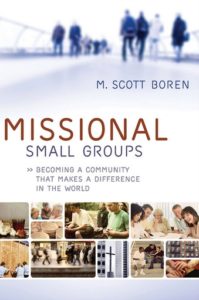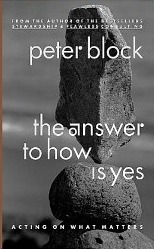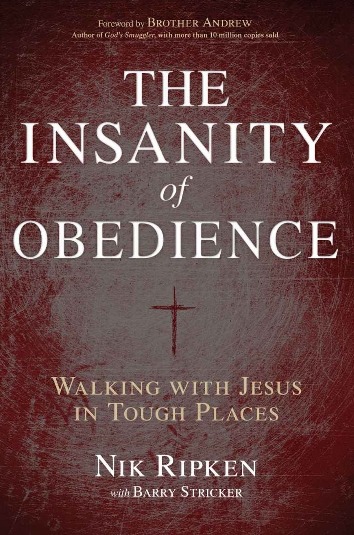Missional Small Groups
by M. Scott Boren
If you are like me and have done all sorts of small groups over the years, maybe you are not too interested in another book on the subject. This one, however, is a little different. Boren attempts to get us to the life source of a small group, rather than simply hand us another set of principles to help us be successful when we gather. He writes about small groups not necessarily being the
“focus; they were simply a mechanism for carrying the kingdom of God to this world.” (p.19)
If we make small groups the “end all,” they will always fall short of our expectations. Again he wrote that he longed for a hidden “rhythm” that would permeate how we live that would enable us to reach those who have no interest in attending church. (p.20) Perhaps this is what you, too, are looking for as we all journey together towards a better and more effective version of missional and incarnational living.
“Instead of doing groups for he sake of experiencing community, groups experience community for the sake of participating in God’s redemption of creation.” (p.23)
Boren agrees with Alan Roxburgh that one of our most important tasks is to become good listeners and conversationalists with those who live around us. He names three topics about which we in the church need to discuss. The first one is about the need for God’s people to live as missionaries in our own land. The United States is becoming increasingly post-Christian and post-modern in its thinking. Unless we come to terms with that, we are in danger of becoming marginalized and ineffective. The second conversation topic revolves around what it means to be the church and how we must live incarnationally so that we are good advertisements for God’s kingdom. This requires commitment, communion, community, and commission. The third topic is about God, the gospel, and what God is doing in the world. (pp.24-25)
Boren defines being missional as “putting love where it is not.” (p.34) He says we must “learn to be relational in the way we interact with one another and in our neighborhoods.” (p.34) I would add we must become missional in whatever “context” we find ourselves, whether it be our neighborhood, workplace, school, civic club, sports team, and so on. God has strategically placed us where we can influence people toward God.
“Being relational and being missional are intricately connected. We cannot divide the two.The church has nothing to offer the world if it does not embody the message of Good News that it aims to share.” (p.35)
This is what it means to be “incarnational.” This is because the world is not interested in religious hypocrisy.
The author points out that small groups usually revolve around one of four stories – personal improvement, lifestyle adjustment, relational revision, and missional re-creation. I found the chapter about “Listening to Your Small Group Story” very interesting and realize now that before we became LifeNet we never really got past the lifestyle adjustment group.
Personal Improvement Groups
The personal improvement group is all about meeting with other Christians only a fairly regular basis that is convenient in order to do short-term Bible and topical studies and to share with one another a little about what is going on in our lives. The result is a fledgling sense of community and a perception that the quality of our lives improving. (p.39)
Lifestyle Adjustment Groups
Lifestyle adjustment groups require a greater commitment to making coming together a priority. A greater level of belonging results, too, as members spend more time together, do social events as a group, and learn to take care of one another. It is Boren’s contention that most church small groups in America are in this category. People learn to adjust their lives away from the influences and pull of the predominant culture. (p.40)
Relational Revision Groups
The third type of group is the relational revision group. In Boren’s words, the most important part of this
“group, however, is not the meetings; it is how we are connected the other six days…And this connectedness usually spills out into the neighborhood.” (p.41)
In this kind of group, the members are intentionally learning to do life together differently, that is, the kingdom of God way. This type of group chooses to make the presence of Christ central. (p.42) This type of group is something to which to aspire, but it is not the most missional expression.
Missional Re-creation Groups
The last type of group Boren describes is devoted to missional re-creation. This kind of group may move into and adopt a neighborhood, bringing non-Christians into the community dynamic. Creativity and flexibility are paramount, since no two groups of this type will look alike. The are able to adapt to the needs of the environment in which they minister. It is all about seeing what God wants to do in a neighborhood and together stepping up to the challenge. (p.43)
If you think about it, a good group actually embodies elements of from all four types. I do not believe that groups can just start out at the missional recreation stage. We have to work our way there by learning to love each other, by spending time together, and by keeping focused on God’s call to be sent out.
Becoming a truly missional small group is more of a journey than a destination. (p.48)
But, lest anyone think the transition will be easy or pain free, Boren warns,
“There is a Jordan River that divides Improvement and Adjustment from Revision and Recreation.” (P.51)
God takes us on a journey through the desert of frustration and emptiness to create in us a hunger that motivates us to cross over into greater fruitfulness that comes from becoming part of God’s incarnational mission to those who do not yet know Jesus.
Pastors must understand that people will not change or embrace the new paradigm simply by listening to sermons on the topic. We have a need to see God’s kingdom life modeled.Church leaders and those who have already caught the vision must live out what it means to be missional and incarnational and invite others into the experience. This journey into the missional experience will be filled with experiments. We must be willing to try things in order to learn what works and what does not. We must be willing to take risks and depend on the Holy Spirit. We must ask God to use us to reach and love people.
The second part of Boren’s book is devoted to “Practice.” Just how do we get from where we are now to where we want to go or, rather, where God wants us to go?
“Being missional is about who we are, not just what we do. Therefore missional life is not simply about the body of Christ having hands and feet so we do something for the world. Living missionally depends on how we relate to God and how we relate to one another as much as how we relate to those outside the church.” (p.63)
Christianity requires community if it is going to be modeled correctly. We learn to live and love as Christ would have us do and we invite others into the experience.
“The way we pray, the way we experience God, the way we interact with each other, and the way we deal with conflict is just as missional as anything we might do for those outside the church.” (p.63)
Boren argues that
“community is actually the context in which we do the [spiritual] disciplines. Spiritual formation is not something I do alone and then contribute to the community.” (p.64)
He identifies three rhythms of missional life that are broken down into practices that groups can adopt. The three rhythms are Communion – the practice of God’s presence, Relating – the practice of agape, and Engagement – the practice of interacting with the neighborhood. (pp.62-63)
The final chapter describes the character of the persons who will be leading these groups. All in all, the book provides a framework for understanding mission and provides some practical things that will help a group get there.




